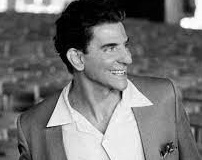|








|
Jew Casting or Jew Face?


I grew up in a Jewish household. Like many such families, when watching TV and movies we would discuss, sometimes argue, about who was Jewish and who wasn’t. Harrison Ford was Jewish, right? Billy Crystal definitely was but Robin Williams wasn’t. Alan Alda wasn’t, but his wife was. Leonard Nimoy was always very open about his Jewishness, but William Shatner not so much. Going back a little we had Goldie Hawn and Carrie Fisher, before them Kirk Douglas and Tony Curtis, and before them the Marx Brothers. Today, Paul Rudd, Ben Stiller, Seth Rogen and Adam Sandler are unapologetically Jewish. Of course, there’s the King, Mel Brooks.
While I’m not an observant Jew, I still take pride in that part of my identity. Some of that pride took root in the many Jewish performers I saw in the movies and on television. No, Jews don’t run Hollywood, although many of the studio heads that created the movie business were Jewish. The truth remains though, that while Jews have historically struggled to break into certain fields, show business was not one of them. Unlike many other minority groups, Jews have never lacked for representation. Yes, some Jews changed their names to sound more “American,” but so did Cary Grant (originally Archibald Leach) and Marilyn Monroe (originally Norma Jean Baker, who incidentally, converted to Judaism.)
The vibrant show business legacy makes some of the recent mini-controversies that much more irritating. The non-Jewish Helen Mirren played the famed Israeli Prime Minister Golda Meir in Golda. Last year Variety reported that “in the U.K., where production wrapped last month, Mirren’s casting as one of history’s most heroic Jewish women has caused some disquiet.” A prominent actress said she objected to Mirren’s casting “because the Jewishness of the character is so integral. I’m sure she will be marvelous, but it would never be allowed for Ben Kingsley to play Nelson Mandela. You just couldn’t even go there.” Let’s unpack the inanity of that statement. Kingsley beautifully played a Jewish businessman in Schindler’s List although he’s not Jewish. Danny Glover, Morgan Freeman and Idris Elba have all portrayed Mandela. They are all black, but none of them are South African.
More recently, similar complaints popped up again when Netflix released the trailer for Maestro, the Leonard Bernstein biopic. Non-Jewish Bradley Cooper directs and stars as Bernstein. Not only did Cooper have the temerity to think he could play someone who didn’t have the same religion he did, but he also committed the cardinal crime of wearing a fake nose. Time reported how some social media critics called this “Jewface,” trying to draw a parallel with the abhorrent “blackface” and “yellowface” of years past. With both “blackface” and “yellowface” Caucasians would put on black or yellow makeup to play stereotypical caricatures of African-Americans and Asian-Americans. This was at a time when opportunities for those groups were extremely limited.
It stretches credibility to compare Cooper to Amos ‘N’ Andy or Mickey Rooney in Breakfast at Tiffany’s, but that doesn’t stop people from trying. Bernstein’s children stepped in to defend Cooper, stating that “Bradley Cooper included the three of us along every step of his amazing journey as he made his film about our father. We were touched to the core to witness the depth of his commitment, his loving embrace of our father's music, and the sheer open-hearted joy he brought to his exploration. It breaks our hearts to see any misrepresentations or misunderstandings of his efforts.” Regarding “Nosegate” they added “It happens to be true that Leonard Bernstein had a nice, big nose. Bradley chose to use makeup to amplify his resemblance, and we’re perfectly fine with that. We’re also certain that our dad would have been fine with it as well. Any strident complaints around this issue strike us above all as disingenuous attempts to bring a successful person down a notch — a practice we observed all too often perpetrated on our own father.”
Maybe Cooper overdid it a little with the nose but so did Nicole Kidman playing Virgina Woolf in The Hours, and she won an Oscar. It’s an actor trying to look more like the person he is playing. The real issue is about representation morphing into a dogma that only members of a group can portray members of that group. As Mirren said, “Okay, so let’s say only Jews can portray Jews, but what about non-Jews?” Marginalized communities should be able to tell their stories, and actors from those communities should have opportunities that have long been denied them. Changing that into a required exact demographic match between actor and role, ignores much of what we love about performance – the ability to find the soul of a different person, to find a character’s emotional truth.
Yes, we have many examples of non-Jews playing Jews. Besides Mirren and Cooper, Felicity Jones played Ruth Bader Ginsburg in On the Basis of Sex, Gary Oldman starred as Herman J. Mankiewicz in Mank, and Oscar Isaac was a Mossad agent in Operation Finale. The Jew/Non-Jew casting debate grew so ridiculous that some criticized Steven Spielberg for casting Michelle Williams and Paul Dano as Jews in The Fabelmans. Of course, the Jews he selected them to play were his parents. I wonder what these trolls would have said to Spielberg’s face. “No, I have a better idea who should play the people that raised and nurtured you.” On the other hand, Harrison Ford was Branch Rickey, a devout Christian, in 42. Natalie Portman’s Judaism didn’t stop her from getting an Oscar nomination for her work as Jackie Kennedy in Jackie.
With casting the issue should always be whether the actor has the talent and artistry to play the role. While I am by no means a Golda Meir expert, I have learned about her. Mirren nailed Meir’s toughness, determination, but also her anguish dealing with the Yom Kippur War. With Mirren’s dazzling track record and dramatic chops, I’m glad director Guy Nattiv (who is both Israeli and Jewish) picked her, assuming Meryl Streep was unavailable. The only insult would have been if Nattiv had picked an actress unworthy of the role.
The truly sad part about my Jewish brethren looking for antisemitism that isn’t there, is how real antisemitism is growing. Each year, the Anti-Defamation League (ADL) tracks incidents of antisemitic harassment, vandalism and assault in the United States. For 2022 the ADL reported 3,697 U.S. antisemitic incidents, a 36% increase from 2021, and the highest number recorded since the ADL started tracking these incidents in 1979. The increases included harassment, assaults and vandalism. According to the report, “Significant surges in incidents include high volume increases in organized white supremacist propaganda activity (102% increase to 852 incidents), K-12 schools (49% increase to 494 incidents) and college campuses (41% increase to 219 incidents), as well as deeply troubling percentage increases in attacks on Orthodox Jews (69% increase to 59 Incidents) and bomb threats toward Jewish institutions (an increase from eight to 91 incidents).” Just as concerning “20% of Americans believe six or more antisemitic tropes, which is significantly more than the 11% that ADL found in 2019.”
Over the past several years the cultural and ideological discourse shifted, giving antisemites, along with racists and xenophobes, an opening to spread their filth. Politicians who spouted these beliefs have won elected offices. I still get chills thinking about the hateful marchers in Charlottesville chanting “Jews will not replace us!” and then America being told there were “good people on both sides.” Kanye West, or Ye, or whatever he’s known as now, openly made antisemitic statements, going so far as to praise Hitler and dispute the facts of the Holocaust. The ADL reported that “the impact of Ye’s comments was felt on the ground across the country. Fifty-nine antisemitic incidents from October 11 through the end of 2022 directly referenced Ye, including 44 cases of harassment, 13 cases of vandalism and two cases of assault.”
Thankfully the ADL offers recommendations on how to combat antisemitism, including better education, strengthening hate crime law enforcement, improved security at Jewish institutions, and applying pressure to social media platforms to stop online hate. Nowhere do they mention stopping Bradley Cooper from wearing a fake nose. Nowhere do they mention ensuring that only Jews play Jews. The “Jewface” allegations serve merely as a distraction from actual antisemitism, and it’s a distraction we cannot afford.
Adam Spector
October 1, 2023
Contact us:  Membership Membership
For members only:  E-Mailing List
E-Mailing List
 Ushers Ushers
 Website Website
 All
Else All
Else
|